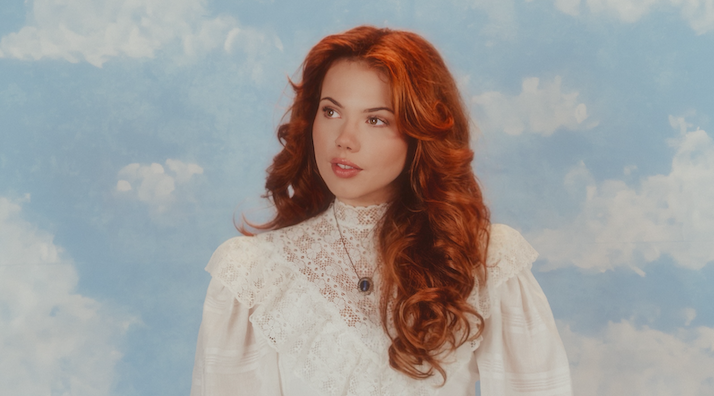Madisyn Gifford Bares Her Soul in a Quiet Contemplation of Sunshine

Photo: Matthew Miller
Being an artist means baring your soul, and Madisyn Gifford does just that in her new album A Quiet Contemplation of Sunshine. Gifford allows listeners to take a peek into her romantic past, the good, the bad, and the complicated.
The album’s opener, appropriately titled “Intro,” is an intimate welcome to A Quiet Contemplation of Sunshine. The voice note style song features a quiet din of background noise before Gifford begins to speak. “Hi. Um, ok so this is really weird but, I just wrote this song and I felt like it was kind of an injustice not to send it to you. I don’t know, I should just stop talking and start singing,” she says, somewhat shyly, inviting listeners into her world.
Gifford starts singing on the following track, the titular “Quiet Contemplation of Sunshine.” The tone for the album is set in this song, as Gifford reflects on a version of herself that no longer exists. She sings “Been in the middle of a little funeral for years / Greatly loved and deeply missed / The girl you buried here.” Gifford is still in mourning of the girl she used to be, but is trying to come to terms with her loss by contemplating sunshine. In the second verse it appears as though she has made some progress as she sings “Hey world guess what? / Watch out, I’m back in town / Singing my favorite songs on the car ride down / Sitting pretty passenger side / Finally I see the view / Wouldn’t be the girl I am if she hadn’t been killed by you.”
Gifford continues her introspection in “Seventeen” as calls herself out for the fears and bad habits she picked up at 17. In the second chorus she sings “‘I won't let you run’ you said to me / I wear my heart on my face not my sleeve / And I’m scared I might be falling deep / Picked that fear up around / Seventeen.” A steady drumbeat underscores the lyrics, reminiscent of a pounding heart, emphasizing the fear and hesitation that Gifford is feeling.
In “Die Happy,” Gifford has left behind her childhood fears and allowed herself to be content in a relationship, to the point where even mundane chores like dishes in the sink and drying laundry are worth mentioning. The joy doesn’t last long however, as Gifford calls out a man that did her wrong in “Fast One.” “Overpriced” continues the frustration found in “Fast One,” as Gifford reflects on a week-long relationship that caused her six months of pain. The bad relationship woes continue in “What Love Is” where Gifford criticizes a partner who played on his computer while she was “sobbing in the ER,” and realizes that she never actually loved him.
In “Sisterhood” and “Father’s Day”, Gifford takes a step back from romantic relationships. “Sisterhood” is an anthem for friendship breakups, which are sometimes a million times more painful than romantic breakups. Speaking on “Father’s Day,” Gifford shared that it came about after she had an existential crisis about the meaning of life and the passing of time at dinner with her parents on Father’s Day, followed by a 2 a.m panic attack. Gifford’s vocals are full of sorrow and the accompanying piano, acoustic guitar, and strings help emphasize the pain she feels.
Gifford returns to romantic relationships in “Plain Sight”, a sweet ballad made up of plucking acoustic guitars and gentle vocals. This song highlights the moment of realization that Gifford’s perfect partner, one that doesn’t withhold his love, care, and grace, has been right in front of her.
The album’s final songs “Glad You Got Away” and “The Colour Yellow” illustrate the growth Gifford has gone through both in life and throughout the album. In the former, Gifford reflects on a teenage relationship, looking back at it fondly, but recognizing it was never meant to last as she sings “And I’ve got nothing but the nicest things to say / Cause you’re the greatest man I’ve ever known / But I’m glad you got away.” “The Colour Yellow” is similar in theme, with Gifford once again reflecting on a past relationship, and again realizing it’s for the better that it ended. She sings “For a time we were / The colour yellow,” but that time has now come to an end.
A Quiet Contemplation of Sunshine takes listeners on a journey through young love and relationships, coming out on the other side full of growth and gratitude. Gifford’s thoughtful lyrics paint vivid pictures, accompanied by a quintessential folk, country composition, inspired by the music she grew up listening to.
“This record is an honest look at the healing all of my past romantic endeavours have forced me to go through, and me standing on the other side of that healing filled with gratitude for all of those experiences - even the painful ones,” Gifford shares. “It feels like the music I would’ve listened to as a teenager, but it also feels very current to who am now writing these stories in hindsight.

-1772133370.jpeg)

